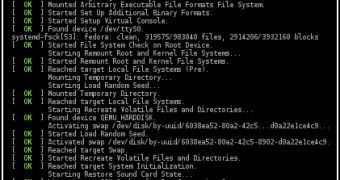systemd, a system and service manager for Linux, compatible with SysV and LSB init scripts that provides aggressive parallelization capabilities and uses socket and D-Bus activation for starting services, is now at version 197.
systemd 197 is mainly just a maintenance release, but it also comes with some new features that users might be interested in.
As stated in the previous version, systemd 197 will be implemented in Fedora 19, once it will properly get on the development track.
Highlights of systemd 197:
• Timer units now support calendar time events in addition to monotonic time events. This means that uses can now trigger a unit based on a calendar time specification such as "Thu,Fri 2013-*-1,5 11:12:13" which refers to 11:12:13 of the first or fifth day of any month of the year 2013, given that it is a Thursday or Friday; • udev now supports a number of different naming policies for network interfaces for predictable names, and a combination of these policies is now the default; • Auke Kok's bootchart implementation has been added to the systemd tree; • nss-myhostname has been integrated into the systemd source tree; • The read-ahead logic is now capable of properly detecting whether a btrfs file system is on SSD or rotating media. Before this change got implemented, it was only capable of detecting this on traditional file systems such as ext4; • Additional device properties are now read in udevfrom the IAB in addition to the OUI database; • systemd and nspawn can now accept socket file descriptors when they are started for socket activation; • A number of PolicyKit actions are now bound together with "imply" rules; • The EnvironmentFile= setting in unit files now supports file globbing.
A detailed changelog of the new release is available in the mailing list. Download systemd 197 right now from Softpedia.

 14 DAY TRIAL //
14 DAY TRIAL //